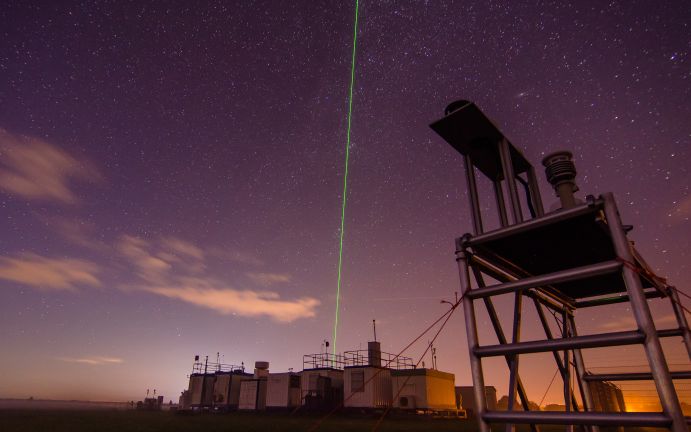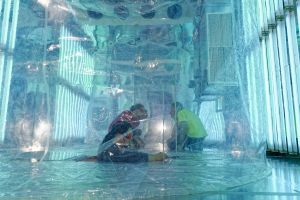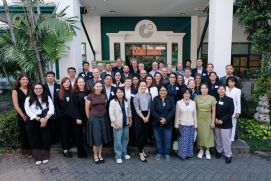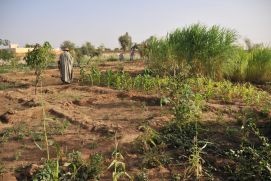ACTRIS-D: Observation of aerosols, clouds and trace gases and their complex interactions in the system of atmosphere, climate, environment and humans
Climate change is complex and is not only determined by greenhouse gases. Less well known is the significance of natural and man-made particles in the air, the so-called aerosols, simplistically also referred to as particulate matter.

Fine dust or, in other words, aerosol particles play an important role in cloud and precipitation processes. They help control the entire life cycle of a cloud. They also influence the radiative properties of clouds and thus their effect on the climate. Likewise, aerosol particles are directly involved in radiative transfer in the atmosphere.
Aerosols and short-lived trace gases can also affect human health. Therefore, information on concentrations and spatial distribution of aerosols and short-lived trace gases is necessary to reduce air pollution and associated negative effects on human health and the ecosystem.
The amount and composition of particulate matter and other aerosol particles changes due to economic activities. However, the climate impact of aerosols, short-lived trace gases and clouds is not yet represented with sufficient precision in current climate models. This is due to a lack of information about these short-lived constituents in the atmosphere. This knowledge gap is to be closed by the international observation network ACTRIS ("Aerosols, Clouds and Trace Gases Research Infrastructure") and will be further expanded for this purpose. ACTRIS will thus also make important contributions to the foundations of the UN Convention on Climate Change and to the implementation of the Paris Agreement on Climate Change.
ACTRIS-D is the German contribution to ACTRIS. The set-up phase of ACTRIS-D was started on July 1st, 2021 with the funding of the collaborative project "Central Facilities". In August 2021, the second collaborative project of the "National Facilities" started. The set-up phase for ACTRIS-D covers the period from 2021 to 2029, during which the German Federal Ministry of Research, Technology and Space (BMFTR) will provide a total of 86 million euros. The utilization phase (including test phase) will take place in the period from 2026 to at least 2036.
In recent years, the BMFTR has invested considerably in research on the detection and assessment of greenhouse gases and aerosols and is consistently continuing this commitment with ACTRIS-D.

The findings from the measurements and analyses in ACTRIS-D will provide an important basis for the development of further measures to reduce greenhouse gas emissions. Furthermore, ACTRIS-D provides policymakers with reliable data on air quality as well as the respective state of the climate, on the basis of which environmental policy decisions can be made and rules and laws can be developed.
Under the leadership of the Leibniz Institute for Tropospheric Research (TROPOS), ACTRIS-D involves the Forschungszentrum Jülich GmbH (FZJ), the Karlsruhe Institute of Technology (KIT), the Alfred Wegener Institute with the Helmholtz Centre for Polar and Marine Research (AWI), the Ludwig Maximilian University of Munich (LMU), the University of Bremen, the University of Cologne, the Bergische Universität Wuppertal (BUW), the Goethe University Frankfurt am Main (GUF) as well as the German Weather Service (DWD) and the Federal Environment Agency (UBA).
Background: ACTRIS research infrastructure
Climate change is a global phenomenon. International exchange is therefore fundamental for successful climate research. The pan-European research infrastructure ACTRIS aims to explore hitherto poorly understood volatile trace gases, aerosols and clouds and their impact on air quality and climate. It provides data and services to enhance current capabilities for analyzing, predicting, and assessing past, present, and future changes in the atmospheric environment. Furthermore, the research infrastructure characterizes 4D variability in the physical and chemical properties of short-lived atmospheric constituents, from the ground through the troposphere to the stratosphere. Thus, ACTRIS serves a large user community in the fields of atmospheric modeling, satellite remote sensing, climate and weather analysis and prediction, and provides access to advanced technological platforms for atmospheric process research and technological innovation.
As a result of long-term collaboration within the atmospheric research community, ACTRIS was included in the ESFRI Roadmap (ESFRI – European Strategy Forum on Research Infrastructures) in 2016.
News about the measure
Last updated on






